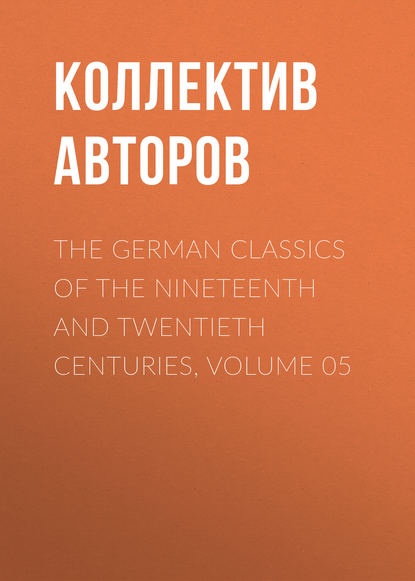По всем вопросам обращайтесь на: info@litportal.ru
(©) 2003-2024.
✖
The German Classics of the Nineteenth and Twentieth Centuries, Volume 05
Настройки чтения
Размер шрифта
Высота строк
Поля
"Well, then," said Herr Lionardo, "Fräulein Flora, who is trying to look as if she neither knew nor had heard anything of the whole affair, had exchanged hearts in a hurry with somebody. Whereupon somebody else appears, and with sound of trumpet and drum offers her his heart, and wishes for hers in return. But her heart is already bestowed upon somebody, and somebody's heart is in her possession, and that somebody will neither take back his heart nor give back hers. All the world exclaims—but have you never read any romances?" I shook my head. "Well, then, at all events you have taken part in one. In brief, there was such a jumble with the hearts that somebody—that is, I—had to take matters in hand. I sprang on my horse one warm summer night, mounted Fräulein Flora as the painter Guido on another, and rode toward the south, to conceal her in one of my lonely castles in Italy till all the fuss about the hearts should be over. But on the way we were tracked, and from the balcony of the Italian inn before which you kept, sound asleep, such admirable watch, Flora suddenly caught sight of our pursuer." "The crooked Signor, then—" "Was a spy. Therefore we secretly took to the woods, and left you to travel post alone over our prearranged route. That misled our pursuer, and my people in the mountain castle besides; they were hourly expecting the disguised Flora, and with more zeal than penetration they took you for the Fräulein. Even here at the castle they thought Flora was among the mountains; they inquired about her, they wrote to her—did you not receive a note?" In an instant I produced the note from my pocket: "This letter, then—?" "Is addressed to me," said Fräulein Flora, who up to this point had seemed to be paying no attention to our conversation. She snatched the note from me, read it, and put it into her bosom. "And now," said Herr Lionardo, "we must hasten to the castle, where they are all waiting for us. In conclusion, as a matter of course, and as is fitting for every well-bred romance—discovery, repentance, reconciliation; but we are all happy together once more, and the wedding takes place the day after tomorrow!"
Just as he had finished, a terrific racket of drums and trumpets, horns and clarionets, was suddenly heard in the shrubbery; guns were fired at intervals, loud cheers were given, the little girls began to dance again, and heads appeared among the bushes as if they had grown out of the earth. I ran and leaped about in all the hurry and scurry, but as it began to grow dark I only gradually recognized all the faces. The old gardener beat the drum, the students from Prague in their cloaks played away, and among them the Porter fingered his bassoon like mad. When I suddenly perceived him thus unexpectedly, I ran to him and embraced him with enthusiasm, causing him to play quite out of time. "Upon my word, if he should travel to the ends of the earth he would never be anything but a goose!" he said to the students, and then went on blowing away at his bassoon in a fury.
Meanwhile, the lovely Lady fair had privately escaped from all the noise and confusion, and had fled like a startled fawn far into the depths of the garden.
I caught sight of her in time and hurried after her. In their zeal the musicians never noticed us; after a while they thought that we had decamped to the castle, and then the entire band took up the line of march in that direction.
We, however, almost at the same moment reached a summer-house on the borders of the garden, whence through the open window there was a view of the wide, deep valley. The sun had long since set behind the mountains, a rosy haze glimmered in the warm fading twilight, through which the murmur of the Danube ascended clearer and clearer the stiller grew the air. I looked long at the lovely Countess, who stood before me heated with her flight and so close that I could almost hear her heart beat. Now that I was alone with her I could find no words to speak, so great was my awe of her. At last I took heart of grace, and clasped in mine one of her little white hands—and in one moment her head lay on my breast and my arms were around her.
In an instant she extricated herself and turned to the window to cool her glowing cheeks in the evening air. "Ah," I cried, "my heart is full to bursting, but it all seems like a dream to me!" "And to me too," said the lovely Lady fair. "When, last summer," she went on after a while, "I came back with the Countess from Rome where we fortunately found Fräulein Flora, and had brought her back with us but could hear nothing of you either there or here, I never thought all this would come to pass. It was only at noon today that Jocky, the good, brisk fellow, came breathless into the court-yard and brought the news that you had come by the mail-boat." Then she laughed quietly to herself. "Do you remember," she said, "that time when I came out on the balcony? It was just such an evening as this, and there was music in the garden." "And he is really dead?" I asked hastily. "Whom do you mean?" replied the Lady fair, looking at me in surprise. "Your ladyship's husband," said I, "who was with you on the balcony." She flushed crimson. "What strange fancies you have in your head!" she exclaimed. "That was the Countess's son, who had just returned from his travels, and, since it happened to be my birthday, he led me out on the balcony with him that I might have a share of the cheers. Was that why you ran away?" "Good heavens, yes!" I cried, striking my forehead with my hand. She shook her head and laughed merrily.
I was so happy there beside her while she went on chatting so confidingly, that I could have sat listening until morning. I found in my pocket a handful of almonds which I had brought with me from Italy. She took some, and we sat and cracked them and gazed abroad over the quiet country. "Do you see that little white villa," she said after a while, "gleaming over there in the moonlight? The Count has given us that, with its garden and vineyard; there is where we are to live. He found out long ago that we cared for each other, and he is very fond of you, for if he had not had you with them when he was running off with Fräulein Flora they would both have been caught before the Countess had become reconciled to him, and everything would have been spoiled." "Good heavens! fairest, sweetest Countess," I cried out, "my head is fairly spinning with all this unexpected and amazing information; are you talking of Herr Lionardo?" "Yes, yes," she replied; "that is what he called himself in Italy; he owns all that property over there, and he is going to marry our Countess's daughter, the lovely Flora. But why do you call me Countess?" I stared at her. "I am no Countess," she went on. "Our Countess took me into the castle and had me educated under her care when my uncle, the Porter, brought me here a poor little orphan child."
Ah, what a stone fell from my heart at these words! "God bless the Porter," I said in an ecstasy, "for being our uncle! I always set great store by him." "And he would be very fond of you," she replied, "if you would only comport yourself with more dignity, as he expresses it. You must dress with greater elegance." "Oh," I exclaimed, enchanted, "an English dress-coat, straw hat, long trousers, and spurs! And as soon as we're married we will take a trip to Italy—to Rome—where lovely fountains are playing, and we'll take with us the Prague students, and the Porter!" She smiled quietly, and gave me a happy glance, while the music echoed in the distance, and rockets flew up from the castle above the garden in the quiet night, and the Danube kept murmuring on, and everything, everything was delightful!
ADALBERT VON CHAMISSO
* * * * *
THE CASTLE OF BONCOURT[37 - Translator: Alfred Baskerville.] (1827)
I dream of the days of my childhood,
And shake my silvery head.
How haunt ye my brain, O visions,
Methought ye forgotten and dead!
From the shades of the forest uprises
A castle so lofty and great;
Well know I the battlements, towers,
The arching stone-bridge, and the gate.
The lions look down from the scutcheon
On me with familiar face;
I greet the old friends of my boyhood,
And speed through the courtyard space.
There lies the Sphinx by the fountain;
The fig-tree's foliage gleams;
'Twas there, behind yon windows,
I dreamt the first of my dreams.
I tread the aisle of the chapel,
And search for my fathers' graves—
Behold them! And there from the pillars
Hang down the old armor and glaives.
Not yet can I read the inscription;
A veil hath enveloped my sight,
What though through the painted windows
Glows brightly the sunbeam's light.
Thus gleams, O hall of my fathers,
Thy image so bright in my mind,
From the earth now vanished, the ploughshare
Leaves of thee no vestige behind.
Be fruitful, lov'd soil, I will bless thee,
While anguish o'er-cloudeth my brow;
Threefold will I bless him, whoever
May guide o'er thy bosom the plough.
But I will up, up, and be doing;
My lyre I'll take in my hand;
O'er the wide, wide earth will I wander,
And sing from land to land.
* * * * *
THE LION'S BRIDE[38 - Translator: A.I. du P. Coleman.]
With myrtle bedecked and in bridal array,
Comes the keeper's fair daughter, as blooming as May.
She enters the cage of the lion; he lies
Calm and still at her feet and looks up in her eyes.
The terrible beast, of whom men are afraid,
Lies peaceful and tame at the feet of the maid,
While she, in her tender adorable grace,
Is stroking his head as the tears stain her face.
"In the days that are gone, we were playmates so true;
Like brother and sister we played, I and you.
Our love was still constant in joy or in pain—
But alas for the days that will ne'er come again!
"You learned to toss proudly your glorious head,
And roar, as you tossed it, a warning of dread;
I grew from a babe to a woman—you see,
No longer a light-hearted child I can be.
"Oh, would that those days had had never an end,
My splendid strong playmate, my noble old friend!
But soon I must go, so my parents decree,
Away with a stranger—no more am I free.
"A man has beheld me, and fancied me fair;
He has asked for my hand—and the wreath's in my hair!
Dear faithful old comrade, my girlhood is dead;
And my sight is bedimmed with the tears I have shed.
Just as he had finished, a terrific racket of drums and trumpets, horns and clarionets, was suddenly heard in the shrubbery; guns were fired at intervals, loud cheers were given, the little girls began to dance again, and heads appeared among the bushes as if they had grown out of the earth. I ran and leaped about in all the hurry and scurry, but as it began to grow dark I only gradually recognized all the faces. The old gardener beat the drum, the students from Prague in their cloaks played away, and among them the Porter fingered his bassoon like mad. When I suddenly perceived him thus unexpectedly, I ran to him and embraced him with enthusiasm, causing him to play quite out of time. "Upon my word, if he should travel to the ends of the earth he would never be anything but a goose!" he said to the students, and then went on blowing away at his bassoon in a fury.
Meanwhile, the lovely Lady fair had privately escaped from all the noise and confusion, and had fled like a startled fawn far into the depths of the garden.
I caught sight of her in time and hurried after her. In their zeal the musicians never noticed us; after a while they thought that we had decamped to the castle, and then the entire band took up the line of march in that direction.
We, however, almost at the same moment reached a summer-house on the borders of the garden, whence through the open window there was a view of the wide, deep valley. The sun had long since set behind the mountains, a rosy haze glimmered in the warm fading twilight, through which the murmur of the Danube ascended clearer and clearer the stiller grew the air. I looked long at the lovely Countess, who stood before me heated with her flight and so close that I could almost hear her heart beat. Now that I was alone with her I could find no words to speak, so great was my awe of her. At last I took heart of grace, and clasped in mine one of her little white hands—and in one moment her head lay on my breast and my arms were around her.
In an instant she extricated herself and turned to the window to cool her glowing cheeks in the evening air. "Ah," I cried, "my heart is full to bursting, but it all seems like a dream to me!" "And to me too," said the lovely Lady fair. "When, last summer," she went on after a while, "I came back with the Countess from Rome where we fortunately found Fräulein Flora, and had brought her back with us but could hear nothing of you either there or here, I never thought all this would come to pass. It was only at noon today that Jocky, the good, brisk fellow, came breathless into the court-yard and brought the news that you had come by the mail-boat." Then she laughed quietly to herself. "Do you remember," she said, "that time when I came out on the balcony? It was just such an evening as this, and there was music in the garden." "And he is really dead?" I asked hastily. "Whom do you mean?" replied the Lady fair, looking at me in surprise. "Your ladyship's husband," said I, "who was with you on the balcony." She flushed crimson. "What strange fancies you have in your head!" she exclaimed. "That was the Countess's son, who had just returned from his travels, and, since it happened to be my birthday, he led me out on the balcony with him that I might have a share of the cheers. Was that why you ran away?" "Good heavens, yes!" I cried, striking my forehead with my hand. She shook her head and laughed merrily.
I was so happy there beside her while she went on chatting so confidingly, that I could have sat listening until morning. I found in my pocket a handful of almonds which I had brought with me from Italy. She took some, and we sat and cracked them and gazed abroad over the quiet country. "Do you see that little white villa," she said after a while, "gleaming over there in the moonlight? The Count has given us that, with its garden and vineyard; there is where we are to live. He found out long ago that we cared for each other, and he is very fond of you, for if he had not had you with them when he was running off with Fräulein Flora they would both have been caught before the Countess had become reconciled to him, and everything would have been spoiled." "Good heavens! fairest, sweetest Countess," I cried out, "my head is fairly spinning with all this unexpected and amazing information; are you talking of Herr Lionardo?" "Yes, yes," she replied; "that is what he called himself in Italy; he owns all that property over there, and he is going to marry our Countess's daughter, the lovely Flora. But why do you call me Countess?" I stared at her. "I am no Countess," she went on. "Our Countess took me into the castle and had me educated under her care when my uncle, the Porter, brought me here a poor little orphan child."
Ah, what a stone fell from my heart at these words! "God bless the Porter," I said in an ecstasy, "for being our uncle! I always set great store by him." "And he would be very fond of you," she replied, "if you would only comport yourself with more dignity, as he expresses it. You must dress with greater elegance." "Oh," I exclaimed, enchanted, "an English dress-coat, straw hat, long trousers, and spurs! And as soon as we're married we will take a trip to Italy—to Rome—where lovely fountains are playing, and we'll take with us the Prague students, and the Porter!" She smiled quietly, and gave me a happy glance, while the music echoed in the distance, and rockets flew up from the castle above the garden in the quiet night, and the Danube kept murmuring on, and everything, everything was delightful!
ADALBERT VON CHAMISSO
* * * * *
THE CASTLE OF BONCOURT[37 - Translator: Alfred Baskerville.] (1827)
I dream of the days of my childhood,
And shake my silvery head.
How haunt ye my brain, O visions,
Methought ye forgotten and dead!
From the shades of the forest uprises
A castle so lofty and great;
Well know I the battlements, towers,
The arching stone-bridge, and the gate.
The lions look down from the scutcheon
On me with familiar face;
I greet the old friends of my boyhood,
And speed through the courtyard space.
There lies the Sphinx by the fountain;
The fig-tree's foliage gleams;
'Twas there, behind yon windows,
I dreamt the first of my dreams.
I tread the aisle of the chapel,
And search for my fathers' graves—
Behold them! And there from the pillars
Hang down the old armor and glaives.
Not yet can I read the inscription;
A veil hath enveloped my sight,
What though through the painted windows
Glows brightly the sunbeam's light.
Thus gleams, O hall of my fathers,
Thy image so bright in my mind,
From the earth now vanished, the ploughshare
Leaves of thee no vestige behind.
Be fruitful, lov'd soil, I will bless thee,
While anguish o'er-cloudeth my brow;
Threefold will I bless him, whoever
May guide o'er thy bosom the plough.
But I will up, up, and be doing;
My lyre I'll take in my hand;
O'er the wide, wide earth will I wander,
And sing from land to land.
* * * * *
THE LION'S BRIDE[38 - Translator: A.I. du P. Coleman.]
With myrtle bedecked and in bridal array,
Comes the keeper's fair daughter, as blooming as May.
She enters the cage of the lion; he lies
Calm and still at her feet and looks up in her eyes.
The terrible beast, of whom men are afraid,
Lies peaceful and tame at the feet of the maid,
While she, in her tender adorable grace,
Is stroking his head as the tears stain her face.
"In the days that are gone, we were playmates so true;
Like brother and sister we played, I and you.
Our love was still constant in joy or in pain—
But alas for the days that will ne'er come again!
"You learned to toss proudly your glorious head,
And roar, as you tossed it, a warning of dread;
I grew from a babe to a woman—you see,
No longer a light-hearted child I can be.
"Oh, would that those days had had never an end,
My splendid strong playmate, my noble old friend!
But soon I must go, so my parents decree,
Away with a stranger—no more am I free.
"A man has beheld me, and fancied me fair;
He has asked for my hand—and the wreath's in my hair!
Dear faithful old comrade, my girlhood is dead;
And my sight is bedimmed with the tears I have shed.

















